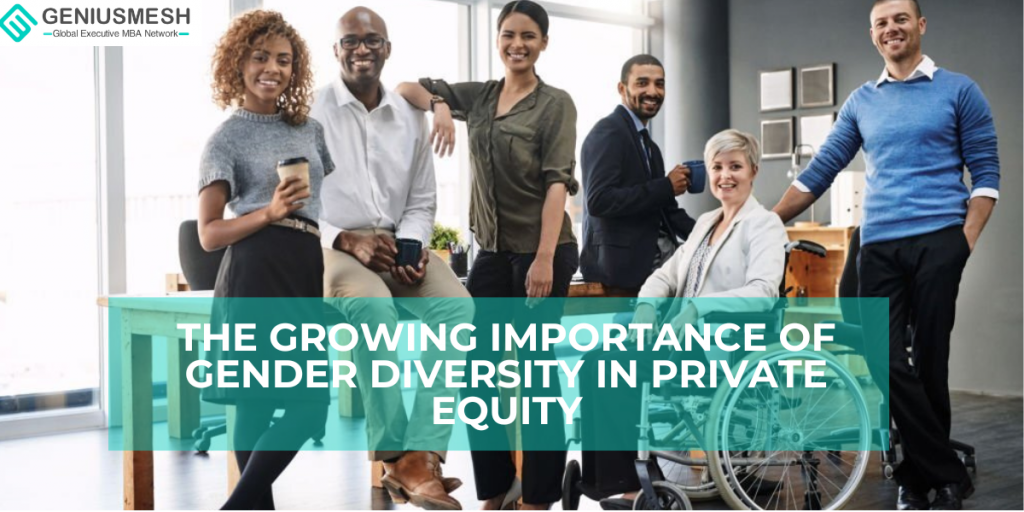Gender diversity is a topic that has gained significant traction in recent years and for good reason. As the world becomes more interconnected and progressive, it is essential that all industries strive towards inclusivity and representation.
One sector where gender diversity has often been lacking is private equity. Historically dominated by men, this industry has struggled to create an environment where women can thrive and contribute their unique perspectives.
However, the importance of gender diversity in private equity cannot be understated. Gender diversity brings numerous benefits to both organizations and society as a whole. From enhancing decision-making processes to fostering innovation, embracing gender diversity in this field is not just about social progress but is also sound business strategy.
The current state of gender diversity in Private Equity
The current state of gender diversity in private equity is still far from ideal. Despite the increasing awareness and efforts to address this issue, women are significantly underrepresented at all levels within the industry, particularly in senior leadership positions. According to a recent study, only around 18% of senior-level executives in private equity firms are women.
What’s even more concerning is the lack of progress being made. In another study conducted over a five-year period, it was found that the percentage of female senior executives in private equity actually decreased slightly from 17% to 16%. This stagnation indicates that gender diversity initiatives alone may not be enough to drive meaningful and lasting change in this industry.
It’s important to acknowledge that diverse teams bring different perspectives and ideas, leading to better decision-making and overall performance. The lack of gender diversity not only hinders opportunities for capable women but also limits the potential for innovation and growth within private equity firms.
In order to achieve true gender equality, there needs to be a collective effort from both firms and individuals to challenge existing norms, promote inclusivity, and provide equal opportunities for all genders in this sector.
Barriers to gender diversity in the Private Equity Industry
There are notable barriers to achieving true gender diversity in the private equity industry.
A few that are worth highlighting include:
- Lack of representation in senior leadership positions
- Unconscious bias in hiring and promotion processes
- Limited access to networking and mentorship opportunities
- Stereotypes and expectations surrounding gender roles
- Work-life balance challenges for women in the industry
Lack of representation and inclusion at senior levels
Research has shown that female professionals only hold a small percentage of leadership positions within private equity firms. This underrepresentation not only limits career progression opportunities for women but also perpetuates a cycle of male-dominated decision-making and perspectives. This lack of representation and perspectives is a huge hinderance to firms and their overall ROI.
Unconscious bias in hiring and promotion processes
A lack of representation and inclusion at senior levels are just a few examples of places where unconscious biases exist within the industry. Private equity has traditionally been regarded as a masculine field, with certain characteristics associated with success in this sector. These biases often result in women being overlooked for promotions or important deal assignments, based not on their abilities but on assumptions about how they may perform in these roles. As a result, these biases hinder the ability of women to advance their careers in private equity and contribute to the overall gender imbalance.
Limited access to networking and mentorship opportunities
There is a scarcity of female role models and mentors in the industry, which further compounds barriers to gender diversity. Having visible role models can be instrumental for inspiring young professionals and demonstrating what is possible for them to achieve. When women are not represented at higher levels or given opportunities to showcase their expertise, it becomes challenging for future generations of women to envision themselves succeeding within private equity.
Stereotypes and expectations surrounding gender roles
Historically, the industry has been male-dominated and lingering biases often associate certain traits and skills with specific genders, hindering women from accessing opportunities and advancing their careers.
Work-life balance challenges for women in the industry
Often viewed as the stereotypical nurturer in a heterosexual family, the demanding nature of the private equity industry poses unique work-life balance challenges for women, especially for those who aspire to leadership roles and have family responsibilities. Long working hours, frequent travel, and an intense deal-focused environment can make it difficult for women to balance professional growth with personal life commitments.
Addressing these barriers requires a concerted effort from firms to challenge unconscious biases, promote inclusive hiring practices, and provide mentorship and support for women to break through traditional gender norms and succeed in the field.
Here is a detailed Guide on – How To Get A Job In Private Equity
Strategies for Increasing Gender Diversity in Private Equity
Focus on recruiting and retaining talented women
Many firms have recognized the importance of gender diversity and are actively seeking out female candidates for leadership roles. However, it is not enough to simply hire more women; efforts must be made to create an inclusive and supportive culture that allows them to thrive.
These efforts to create a move inclusive and supportive culture can involve:
- Implementing mentorship programs
- Providing training and development opportunities specifically tailored to women’s needs
- Promoting a more flexible work environment
Address unconscious bias within the industry
Unconscious biases can prevent qualified women from being given equal opportunities for career advancement in private equity.
Here are two ways firms can address unconscious biases:
- Invest in unconscious bias training programs that educate employees about these biases and provide strategies for mitigating their impact.
- Implement blind resume screening processes or diverse interview panels to ensure that hiring decisions are made based solely on merit and qualifications rather than potential biases.
Fostering partnerships with organizations dedicated to promoting gender diversity
Collaborating with groups such as Women in Private Equity (WIPE) or Catalyst can provide access to a network of accomplished women in the field, as well as valuable resources and insights for improving gender diversity efforts within the organization. These partnerships can help companies connect with a larger pool of qualified talent while also demonstrating their commitment to creating an inclusive workplace.
The Future of Gender Diversity in Private Equity
As more attention is being focused on the lack of representation of women in leadership positions, firms are recognizing the importance of fostering a diverse and inclusive workplace for both ethical and financial reasons. Research consistently shows that diverse teams outperform their less diverse counterparts, leading to increased profitability and innovation.
At GeniusMesh, we are committed to fostering diversity and inclusivity for every intersectionality, including gender. That’s what we’re able to achieve with our vast, global network of elite executives with various backgrounds.
Here are two of the more promising developments that could shape the future of gender diversity in private equity:
The growing interest in impact investing
Impact investing focuses on generating positive environmental or societal outcomes alongside financial returns, presenting an opportunity for private equity firms to prioritize gender equality as part of their investment strategy. By targeting companies with strong track records on gender equality and providing support to businesses with female leaders, private equity investors can contribute significantly to breaking down gender barriers within their own industry.
The rising number of female entrepreneurs and business leaders
The growth of women-led businesses provides an opportunity for private equity firms to invest in companies with a diverse leadership team from the outset. Supporting these entrepreneurs through capital infusion, mentorship programs, and strategic guidance not only benefits individual enterprises but also creates a pipeline for future opportunities for female professionals within the industry.
While progress has been made towards achieving greater gender diversity in private equity, there is still much work ahead. If you are looking to hire executives for your PE firm, connect with us today.

The GeniusMesh team is a group of experts who are pioneers in executive hiring, unparalleled expertise in identifying and securing top-tier leadership talent. We have people from the top 30 Business schools across the globe who write thought-provoking content on Private Equity, Healthcare, Supply chain, Manufacturing, Technology, Finance, Venture Capital & other niches.
GeniusMesh is a pre-vetted network of 12k+ Executive MBAs who have over 16 years of operational & functional experience.

